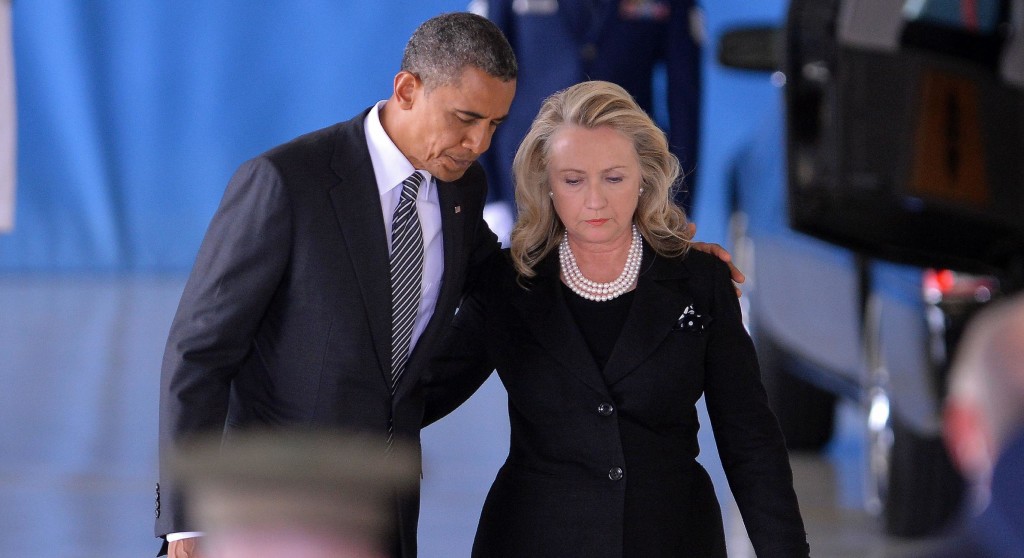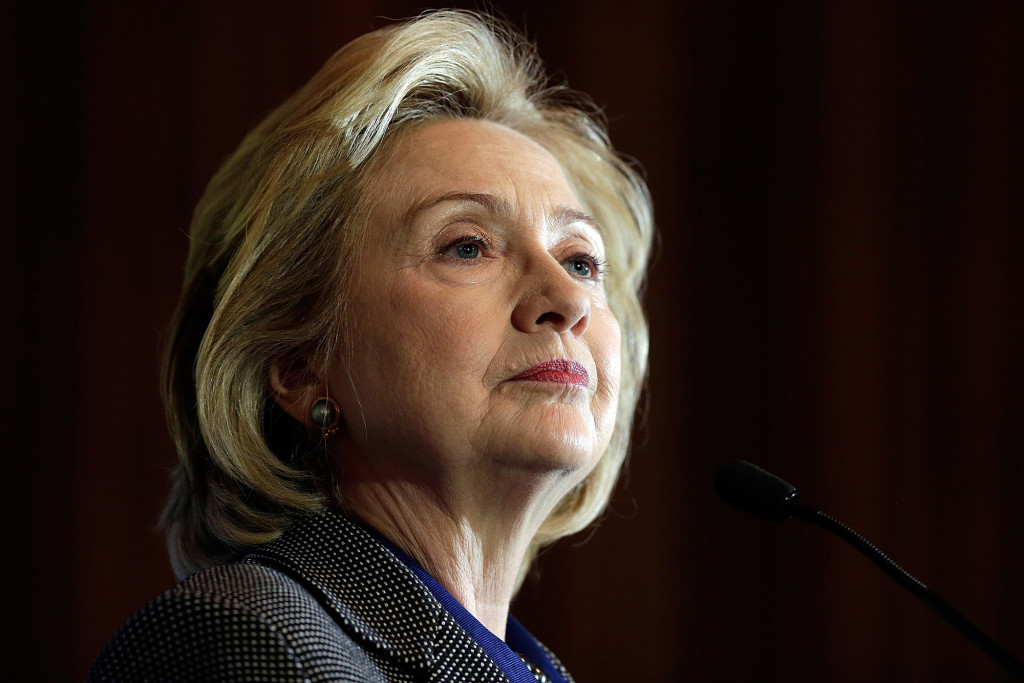Barack Obama: “No political influence” in Hillary Clinton email probe

President Barack Obama is guaranteeing that evidence, not politics, will dictate the outcome of the FBI’s investigation into Hillary Clinton‘s handling of emails as secretary of state. Obama’s comments came during an appearance on Fox News Sunday, his first as president. Obama said he continues to believe Clinton didn’t jeopardize America’s national security with her private email server, but he added that “there’s a carelessness in terms of managing emails” that she has recognized. Obama said no one has suggested that Clinton’s handling of government emails detracted in any way “from her excellent ability to carry out her duties.” When asked specifically whether he can guarantee that Clinton will “not be in any way protected” during the course of the investigation, Obama said he maintains a strict line about not talking to FBI directors about pending investigations. “I guarantee that there is no political influence in any investigation conducted by the Justice Department, or the FBI, not just in this case, but in any case,” Obama said during an interview that was taped during his visit to the University of Chicago School of Law, where he taught. The FBI is investigating whether sensitive information that flowed through Clinton’s email server was mishandled. The inspector generals for the State Department and U.S. intelligence agencies are separately investigating whether rules or laws were broken. Obama touched on several issues during the interview, including the nomination of Merrick Garland to the Supreme Court and how he deals with the threat of terrorism. On Garland’s nomination, Obama said he will stick with him through the end of his term. “What I think we can’t have, is a situation in which the Republican Senate simply says, ‘Because it’s a Democratic president, we are not going to do our job, have hearings, and have a vote,’ ” he said. On terrorism, Obama said he doesn’t think Americans have made too much of the threat of terrorist attack. He also said he hasn’t let acts of terror disrupt some of his regular activities because it’s important to communicate a message of resilience and “that we don’t panic, that we don’t fear.” On what he most looks forward to when leaving office: “Being able to take a walk outside.” On his best and worst day in office. Obama said the best was the day health insurance reform passed and the worst was the day he traveled to Newtown, Connecticut, after the massacre at Sandy Hook. Republished with permission of the Associated Press.
From Homeland to hair: Hillary Clinton emails peek into the personal

The latest release of Hillary Clinton‘s private emails show her, as secretary of state, dealing with the complicated politics of the Arab Spring, fending off questions about her role in the deadly 2012 Benghazi attacks and attempting to navigate an intensifying conflict between Israel and the Palestinians. But they also give a glimpse into the private side of one of the world’s most public people. Clinton’s notes show her searching for videos on how to do a “fishtail bun” hairstyle and struggling to locate Showtime on her television. (She wanted to watch the CIA-centered drama “Homeland.”) She schedules – and reschedules – flights, meals and hairstyling appointments. And as she flies around the globe – logging 956,733 miles over her tenure – she tries to keep track of the time zone. The roughly 7,800 pages of emails released Monday were part of a court-ordered disclosure of correspondence sent from the private server Clinton used while she was secretary of state. Clinton, now the front-runner for the 2016 Democratic presidential nomination, has faced questions about whether her unusual email setup was sufficient to ensure the security of government information and retention of records. Included in the most recent batch was an email that Intelligence Community Inspector General I. Charles McCullough III and State Department Inspector General Steve Linick deemed classified in July. At least two Senate committees are still investigating Clinton’s email arrangement and seeking the release of correspondence from her top aides. The FBI is also investigating the security of Clinton’s private email setup. Two-thirds of Clinton’s 30,000 work-related emails are now at least partially in the public eye – minus numerous redactions by the State Department. Here’s a closer look at some of the messages that churned through Clinton’s very busy in-box in the batch released Monday: — HEALTH POLITICS Get-well-soon notes poured in from across the globe after a stomach virus that Clinton picked up in 2012 became a serious condition that kept her out of the office – and off the congressional witness stand. After a dehydrated Clinton fainted and sustained a concussion – a condition she frequently called her “cracked head” in messages – she was forced to postpone her testimony before the House Foreign Affairs Committee about the deadly Benghazi attacks. Hollywood mogul Harvey Weinstein emailed her aide, Capricia Marshall, offering to send Clinton copies of any movies she wanted to watch while recuperating. Dorothea Hurley, the wife of rock star Jon Bon Jovi, checked in with Clinton’s daughter, Chelsea, to say that they were “sending you all a big hug.” Chelsea forwarded the message to her mother. Her health quickly became a political issue, with Republicans questioning her fitness should she ever run for president. Her staff moved quickly to tamp down the speculation. Top aide Philippe Reines told Clinton he’d reached out to former Tennessee Sen. Bill Frist, a heart transplant surgeon, and the NFL commissioner to enlist their support pushing back on right-wing commentators. “Just not letting these comments stand, no matter who says them,” Reines said. Frist was happy to help, according to the documents. “I love her and respect her and I can help. Not sure how exactly but I know I can help. I will Keep all Confidential,” he wrote. — 2012 ELECTIONS Although Clinton wasn’t on the ticket in 2012, she and her supporters followed the race closely – and had plenty to say. In a January 2012 note, during the heat of the Florida GOP primary, Clinton refers to Mitt Romney as “Mittens” and Newt Gingrich as “Grinch.” “If Mittens can’t beat Grinch in Florida, there will be pressure on state Republican parties to reopen or liberalize ballot access,” she writes to confidant Sid Blumenthal. — BENGHAZI At least a few of the messages have come back to haunt Clinton during her presidential bid. Shortly before 9 p.m. on Sept. 11, 2012, Clinton sent an email asking her daughter to call her at her office about the attack on the U.S. consulate in Benghazi, Libya. The email was addressed to an account under the name “Diane Reynolds,” an alias Chelsea Clinton used for personal messages. “Two of our officers were killed in Benghazi by an al-Qaida-like group: The Ambassador, whom I handpicked, and a young communications officer on temporary duty w(ith) a wife and two young children,” Hillary Clinton later wrote to her daughter. “Very hard day and I fear more of the same tomorrow.” In October, that email was trumpeted by Republicans on the House Benghazi committee as evidence that Clinton knew very quickly the attack on the consulate was the work of Islamic terrorists, not a spontaneous street protest triggered by the release of a video considered an insult to the Prophet Mohammed. In a later television interview, then-United Nations Ambassador Susan Rice suggested the video, which did spark anti-American protests that day in several Muslim countries, was the primary motivation for the attack. Republicans have suggested the Obama administration downplayed the terror threat to avoid stoking public safety concerns in the weeks leading up to the 2012 presidential election. Some of the messages show that Clinton worried about how her own remarks after the attacks would later be perceived. In a September 2012 message, aide Jake Sullivan compiled all her statements and assured Clinton that she was “careful” and “never said ‘spontaneous’ or characterized the motives.” “The way you treated the video in the Libya context was to say that some sought to (asterisk)justify(asterisk) the attack on that basis,” he wrote. — KEEPING THE TEAM TOGETHER Clinton maintained her ties with the Democratic Party donors who supported her past campaigns and could help her in the future. In November 2012, Samuel Kaplan, a Minneapolis lawyer and major Democratic donor who was appointed U.S. ambassador to Morocco, secured a private meeting with Clinton to discuss how he and his wife “might hope to be allied” with her in the future. Former Clinton aide Lauren Jiloty wrote to Clinton in 2012 to say she had


